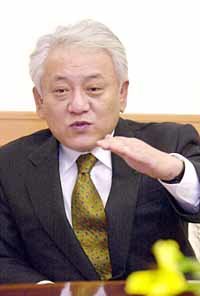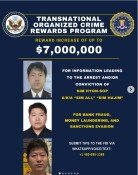Interview with culture-tourism minister
Interview with culture-tourism minister
Posted January. 04, 2001 11:51,

The 21st century is called the century of culture, meaning that it is the time when culture leads the competitiveness even in the economic sector. The following are questions and answers of an interview with Kim Han-Gill, Minister of Culture and Tourism, during which he discussed various pending issues of the cultural world in the New Year and his ministry¡¯s policy direction and business programs.:--- Ed.
Question: What are your ministry¡¯s major programs this year?
Answer: We will do our utmost to support and aid programs designed to upgrade the people¡¯s quality of life with our policies.
Last year, the culture budget exceeded 1 percent of the total government budget for the first time, and this year we have secured 1 trillion won. We will be devoting ourselves to using this money effectively. I think we have to promote pure culture and arts, in principle, but we have to invest in bettering circumstances for creation rather than in cultural people personally.
Q: This year is the Year of Regional Culture, designated by the ministry, but the gap in the cultural nostalgia between urban and rural residents has reached a serious level.
A: Yes. I agree. This gap is a question to be solved urgently. About half of the budget for the Ministry of Culture and Tourism amounting to 500 billion won is to be used for rural regions. We are planning to make use of this money efficiently, thus encouraging the residents¡¯ love of their hometowns and pride, and helping raise the creative power of regional culture.
Q: The ministry often has clashed with economy-related agencies due to policies based on economic logic such as the decision to end the raising of funds for the promotion of culture and arts or a fixed-price system for books. Do you have any good solutions?
A: To my great regret, cultural logic repeatedly has been overwhelmed by economic logic. But I think that if economic reasoning is applied forcibly even to the cultural field, the very existence of culture and arts will be threatened. For instance, all the people stress the need to maintain the current screen quota system in total unity externally, but cultural exceptions are not recognized at home. Is this right?
Recently, it seems that there are frictions between government agencies over the jurisdiction over some businesses. We are in a tug-of-war with the Ministry of Commerce, Industry and Energy over game industry, and with the Ministry of Information and Communication over the protection of digital contents. Allowing two ministries to handle these matters will only make the situation more complicated. We are planning to seek a revision of related laws so that our ministry can handle independently these businesses within the category of existing laws.
Q: The full launch of satellite broadcasting in October is expected to bring about rapid changes in the nation¡¯s broadcasting circumstances. How will your ministry be in charge of broadcasting affairs cope with this?
A: The era of satellite broadcasting means the increase of TV channels to as many as 200. The biggest task is how to utilize them and whether or not to secure content of good quality. There should be no reason for us to introduce satellite broadcasting, if it airs cheap foreign programs of low quality or rebroadcasts programs of the current TV firms. We are now working on comprehensive measures to promote TV broadcasting, such as the fostering of independent production companies of TV programs and broadcasting manpower.
Q: It was expected last year after the Inter-Korean summit that the cultural exchanges would be invigorated between the South and the North, but to no avail. Do you have any plan to expand inter-Korean cultural exchanges?
A: I think that the South and the North should make sustained exchanges in the fields of culture, tourism and sports in order to restore the homogeneity of the nation and trust. For this, the two sides are required to prepare institutional devices like the protocol for cultural exchanges. Since North Korea is also showing an interest in this field, I think there may be a tangible outcome in the near future.







